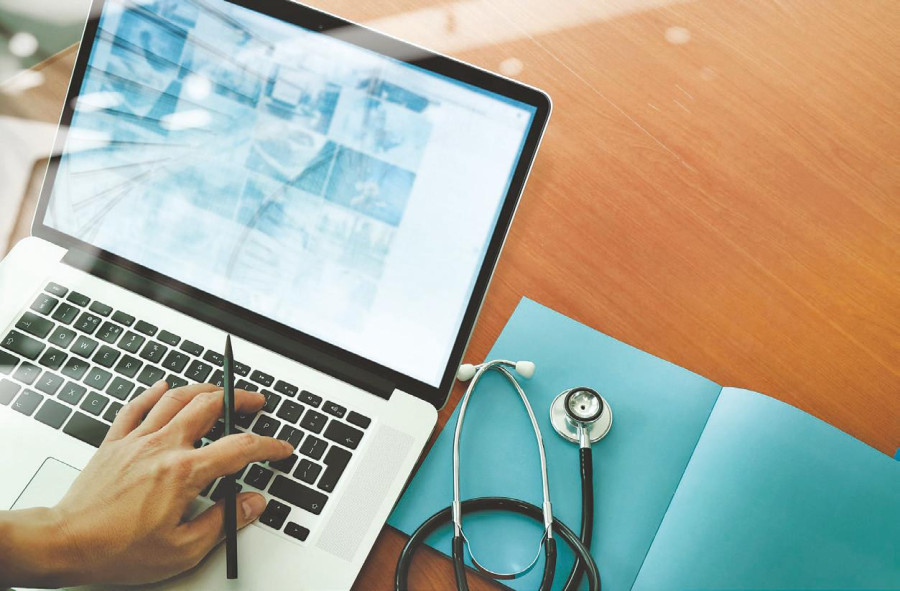Health
Doctors take to social media to inform public about diseases
Experts say ingesting information online is okay but consulting doctors right away in case of health issues is the way to go.
Arjun Poudel
Last Sunday, Dr Sher Bahadur Pun, chief of the Clinical Research Unit at the Sukraraj Tropical and Infectious Disease Hospital, posted a photo of a subconjunctival hemorrhage (broken blood vessel in the eye) on Facebook with an appeal to the public to avoid using non-steroidal anti-inflammatory drugs (NSAIDs) to relieve pain, especially in the case of dengue infection.
The photo depicted the condition of one of his patients who was infected with dengue and had used a high dose of Flexon tablet—an anti-inflammatory drug—to relieve body aches, which resulted in subconjunctival hemorrhage.
“A lot of people infected with dengue virus are taking NSAIDs on their own,” Pun told the Post. “Some doctors seem to prescribe such medicines and antibiotics to the patients as well.”
A subconjunctival hemorrhage is a red spot on the eye caused by a broken blood vessel.
And doctors say using NSAIDs for treatment of dengue infection increases the risk of internal bleeding, including in the eyes, and elevation of liver enzymes which can cause severe effects on the organ.
Pun is among a few doctors who have been regularly writing articles on public health issues, giving interviews, and are active on social media to raise awareness.
The use of mass media—radio, television, newspaper—and social media platforms like Facebook and Twitter have helped disseminate information on various diseases and conditions.
Dengue currently is a menace across Nepal, with cases reported in 72 districts.
On Tuesday, a 36-year-old male patient infected with dengue contacted Dr Prabhat Adhikari, an infectious disease and critical care expert, to inquire about his medicine.
According to Adhikari, the patient, a resident of the Kalimati area, said that a doctor working in a nearby pharmacy had prescribed him Flexon tablets and an antibiotic before he was asked to take a dengue test.
“The next day, the report returned positive for dengue virus but he was asked to continue the antibiotic,” Adhikari told the Post.
“Prescribing high doses of painkillers and antibiotics without knowing the real cause of problems is a common practice among doctors,” Adhikari added. “Instead of providing care following proper diagnosis, many doctors have been providing treatment for symptoms. This is problematic.”
On Tuesday, Adhikari reshared his video from 2019 on Twitter explaining the prevention and control of dengue and urging all not to take antibiotics and NSAIDs when diagnosed with dengue.
“Not only in the case of dengue infection, but people infected with Covid-19 were also given antibiotics,” said Adhikari. “There is no role of antibiotics in viral infections. Unnecessary use of antibiotics can increase antibiotic resistance.”
Disseminating information about diseases, their prevention and control, and medicines can be helpful for people, but doctors say extra care should be taken to ensure that wrong information is not passed on to the public.
Last month, Nepal Medical Council, the national regulatory and licensing body of medical doctors, issued a social media code of conduct for doctors. The council prescribed what could and couldn’t be done by medical doctors.
“When doctors use social media to inform people, to educate them and create awareness, it will be very fruitful to many people and ultimately to the country,” said Dr Bhagwan Koirala, chairman of the council. “The council always promotes doctors to provide factual health information and encourages them to talk about their expertise.”
People usually do not doubt doctors and any wrong information in the public domain could cost lives. Like Koirala, Adhikari also stressed that doctors should stick to their areas of expertise while sharing information for public consumption and back the information with evidence.
Dr Om Murti Anil, an interventional cardiologist, is popular on social media for the information he shares on heart-related issues.
With over 1.1 million followers on Facebook, he presents medical information in a way that the ordinary public can easily understand and regularly posts informative videos on his page.
“People should also know the intent of the message, and make sure that if the person is saying the right thing or not,” said Anil. “If the motive [of posting messages] is to do business by attracting patients to their clinics, or if there is a conflict of interest, then it is wrong and against the ethics of one’s profession.”
Experts say using both offline and online media is an effective means to raise public health awareness. Still, one should check for the authenticity of the information, as the risk of misinformation and disinformation always exists. Without knowing if the sources are authentic or not, one should not trust such information blindly.
According to Adhikari, there are several instances where people have stopped their medications or even self-prescribed drugs or supplements and dietary changes after coming across unsubstantiated advice on social media by unknown people.
“All information that one may come across online and on social media may not always be accurate,” said Dr Krishna Prasad Adhikary, registrar at the Nepal Medical Council. “Accessing information online for one’s knowledge is good, but consulting doctors in case of a health issue is the wise thing to do.”




 25.42°C Kathmandu
25.42°C Kathmandu















